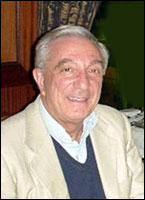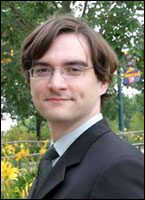|
| |
|

|
|

|
|
Dr. John Casti
|
|
Dr. Chris Pincock
|
|
Dr. John Casti
|
|
|
Institute for Monetary Economics, Technical University of Vienna and Commodicast, Inc.
|
|
|
Biography:
|
I received my Ph.D. in mathematics under Richard Bellman at the University of Southern California in 1970. I worked at the RAND Corporation in Santa Monica, CA, and served on the faculties of the University of Arizona, NYU and Princeton before becoming one of the first members of the research staff at the International Institute for Applied Systems Analysis (IIASA) in Vienna, Austria. In 1986, I left IIASA to take up a position as a Professor of Operations Research and System Theory at the Technical University of Vienna. I was a member of the External Faculty of the Santa Fe Institute in Santa Fe, New Mexico, USA, where I worked on the application of biological metaphors to the mathematical modeling of problems in economics, finance and road-traffic networks. My current affiliation is at the Institute for Monetary Economics, Technical University of Vienna and Commodicast, Inc., Santa Fe, NM.
Over the past few years, I have written numerous articles and seven technical monographs and textbooks on mathematical modeling. In addition, I am the editor of the journals Applied Mathematics & Computation (Elsevier, New York) and Complexity (Wiley, New York). In 1989 my text/reference work Alternate Realities: Mathematical Models of Nature and Man (Wiley, 1989) was awarded a prize by the Association of American Publishers in a competition among all scholarly books published in mathematics and the natural sciences. In 1992, I also published Reality Rules (Wiley, New York), a two-volume text on mathematical modeling.
In addition to these technical volumes, I have written several popular books on science: Paradigms Lost: Images of Man in the Mirror of Science (Morrow, 1989), which addresses several of the most puzzling controversies in modern science, Searching for Certainty: What Scientists Can Know About the Future (Morrow, 1991), a volume dealing with problems of scientific prediction and explanation of everyday events like the weather, stock market price movements and the outbreak of warfare, and Complexification (HarperCollins, 1994), a study of complex systems and the manner in which they give rise to counterintuitive, surprising behavior. My most recent popular science volume is Five Golden Rules: Great Theories of 20th-Century Mathematics---and Why They Matter. It was published by John Wiley & Sons (New York) in September 1995. My next work of popular science is Would-Be Worlds, a volume on computer simulation and the way it promises to change the way we do science. It was published by John Wiley & Sons (New York) in October 1996. I also wrote a volume of �scientific fiction,� involving Ludwig Wittgenstein, Alan Turing, J.B.S. Haldane, C.P. Snow and Erwin Schroedinger in a dinner-party conversation on the question of the uniqueness of human cognition and the possibility of thinking machines. It was published under the title The Cambridge Quintet by Little, Brown (UK) in December 1997 and by Addison-Wesley in the US in early 1998.
More recently, my published books include Goedel: A Life of Logic (Perseus, Cambridge, MA, 2000), Art & Complexity (Elsevier, Amsterdam, 2003), a volume edited with A. Karlqvist, and The One, True, Platonic Heaven (Joseph Henry Press, Washington, DC, 2003), which addresses in a fictional format the question of the limits to scientific knowledge. My current research interests have also shifted somewhat to the exploration of questions in the social and behavioral realm and the relationship between social �moods� and their consequent social actions and behaviors.
|
|
|
Title:
|
Would-Be Worlds: Toward a Theory of Complex Systems
|
|
|
Abstract:
|
By their very nature, complex systems resist analysis by decomposition. It is just not possible to study, say, the human immune system or a stock market, by breaking it up into individual parts---molecules or traders---and looking at what these parts do in isolation. The very essence of the system lies in the interaction among all its parts, with the overall behavior of the system emerging from these interactions. So by throwing away the interactions, one also throws away any hope of actually understanding the workings of the system. The problem is that until very recently, there was no way of studying these sorts of systems as complete entities, since to do experiments with stock markets, immune systems, rainforest ecosystems and the like was either too expensive, too dangerous or just plain too difficult. But the arrival of cheap, powerful, widespread computing capability over the past decade or so has changed the situation entirely.
This talk will examine the way in which the ability to create surrogate versions of real complex systems inside our computing machines changes the way we do science. In particular, emphasis will be laid upon the idea that these so-called �artificial worlds� play the role of laboratories for complex systems, laboratories that are completely analogous to the more familiar laboratories that have been used by physicists, biologists and chemists for centuries to understand the workings of matter. But now we have laboratories that allow us to explore information instead of matter. And since the ability to do controlled, repeatable experiments is a necessary precondition to the creation of a scientific theory of anything, the argument will be made that for perhaps the first time in history, we are now in a position to realistically think about the creation of a theory of complex systems.
These philosophical points will be illustrated by on-going work with artificial road-traffic networks, as well as with systems for studying social and cultural phenomena.
|
|
|
Title:
|
THE BORDERLINE: On the Limits to Scientific Knowledge
|
|
|
Abstract:
|
The story of mathematics in the latter half of this century has to a great extent been the story of "nonexistence" theorems. Goedel's results on the existence of undecidable propositions in number theory and Turing's proof of the undecidability of the Halting Problem in computer science are probably the best-known results of this sort. They demonstrate the existence of mathematical questions that are forever beyond the powers of the human mind to answer by carrying out a computation.
Do the same kind of nonexistence results apply to the seemingly more complex world of natural phenomena? In particular, are there important and interesting scientific questions that defy rational analysis? Given the vastly more complicated types of interactions in areas like physics, biology, and economics than what are found in the vastly simpler domain of arithmetic, it is not unreasonable to suspect that such unanswerable questions do indeed exist. If so, what are they like?
This talk will explore the thesis that the method by which questions are answered in science is to carry out a computation--either explicitly by means of a computer program or implicitly by constructing a mathematical model embodying an algorithmic relationship between the components of a given system. So when it comes to unanswerable scientific questions, we can sharpen the issue considerably by asking whether there are questions that cannot be answered by performing a calculation.
Examples of candidate questions from biology, physics and economics will be presented, along with a consideration of how the three worlds of observations, mathematics and computation interrelate in addressing the question of �limits.�
|
»
BACK TO TOP
|
Dr. Chris Pincock
|
|
|
Purdue University
|
|
|
Biography:
|
I received my Ph.D. in philosophy in 2002 from the University of
California, Berkeley, after completing a dissertation with Prof.
Paolo Mancosu on A Structuralist Approach to Applying
Mathematics. Since then I have been an assistant professor of
philosophy at Purdue University, where my research has focused
on the role of mathematics in scientific theorizing and its
philosophical implications, as well as on the influence of
mathematics and science on developments in early twentieth
century philosophy. To date my work has appeared in Synthese,
Philosophy of Science and Philosophia Mathematica, and I have
recently completed a paper on Bertrand Russell and Rudolf Carnap
which will be published in the Cambridge Companion to Carnap.
|
|
|
Title:
|
When does a mathematical question become a philosophical question?
|
|
|
Abstract:
|
It is common for mathematicians, and even for some philosophers
of mathematics, to think that the questions mathematicians choose
to investigate are unrelated to the questions that philosophers
tend to ask about mathematics itself. A typical contrast might be
between the mathematician who asks whether or not a particular
conjecture can be proven and the philosopher who asks what proofs
are or how proofs can provide mathematical knowledge. Against the
standard view of a wide separation between mathematical and
philosophical questions, I argue that philosophical issues crop
up throughout mathematical research and that implicit
philosophical presuppositions often shape how mathematics
develops. This is easy to show for foundational parts of
mathematics like logic and set theory, but also clearly occurs in
more usual parts of mathematics. The lesson drawn is that
prospective mathematicians can become better mathematicians if
they take account of some philosophy of mathematics.
|
»
BACK TO TOP
|
|
|